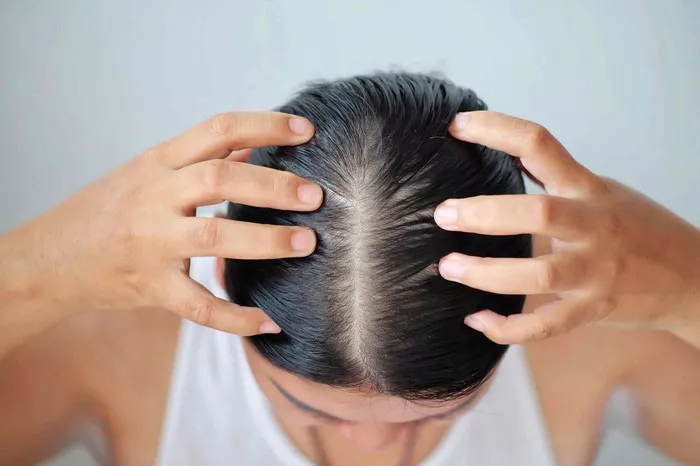Polycystic Ovary Syndrome (PCOS) is a common hormonal disorder that affects women of reproductive age, leading to a range of symptoms that can impact overall health and well-being. One of the frequently observed manifestations of PCOS is hair loss, which can significantly affect a woman’s self-esteem and quality of life. Understanding the relationship between PCOS and hair loss is crucial for early detection, appropriate management, and the implementation of effective treatment strategies to address both the underlying hormonal imbalance and the associated hair loss.
I. Understanding PCOS and its Hormonal Imbalance
PCOS is characterized by hormonal imbalances that disrupt the normal functioning of the reproductive system, leading to the development of small cysts on the ovaries. Women with PCOS often experience elevated levels of androgens, such as testosterone, which can interfere with the normal hair growth cycle. The excess androgens can cause the hair follicles to become sensitive, leading to a condition known as androgenic alopecia or female pattern hair loss, characterized by thinning of the hair, especially at the crown and temple areas.
II. Identifying the Symptoms of PCOS-Related Hair Loss
Hair loss associated with PCOS typically presents as a gradual thinning of the scalp hair, rather than complete baldness, and it often follows a pattern similar to male pattern baldness. Women may notice a widening part, a reduction in overall hair density, and an increase in hair shedding. Additionally, some women with PCOS may experience hirsutism, which is the excessive growth of hair in areas where men typically grow hair, such as the face, chest, and back. Identifying these symptoms can help in early detection and prompt management of PCOS-related hair loss.
III. Managing Hormonal Imbalance and Hair Loss
Managing PCOS-related hair loss often involves addressing the underlying hormonal imbalance through a combination of lifestyle modifications, medication, and targeted treatments. Lifestyle changes, such as maintaining a healthy diet, engaging in regular exercise, and managing stress levels, can help improve insulin sensitivity and hormone regulation, leading to a reduction in androgen levels and a potential improvement in hair loss. Healthcare providers may also prescribe oral contraceptives or anti-androgen medications to help regulate hormone levels and minimize the impact of androgenic alopecia.
IV. Exploring Hair Restoration Options
In cases where hair loss due to PCOS has led to noticeable thinning or significant loss of hair, exploring hair restoration options can help improve hair density and overall appearance. Treatments such as minoxidil, a topical solution that promotes hair growth, and low-level laser therapy, which stimulates the hair follicles, may be recommended to enhance hair regrowth and slow down the progression of hair loss. Surgical options, such as hair transplants, may also be considered for individuals with advanced hair loss and a desire for more significant hair restoration.
V. Consulting a Healthcare Provider for Comprehensive Evaluation
If you suspect that your hair loss may be related to PCOS, it is crucial to consult a healthcare provider for a comprehensive evaluation and appropriate management. A healthcare provider can perform hormone level tests, assess ovarian function, and evaluate the extent of hair loss to determine the most suitable treatment approach. By addressing the underlying hormonal imbalance and implementing targeted interventions, healthcare providers can help minimize the impact of PCOS-related hair loss and improve overall hair health and appearance.
VI. Implementing a Holistic Approach to Treatment
A holistic approach to treating PCOS-related hair loss involves addressing not only the physical symptoms but also the emotional and psychological impact of the condition. Women with PCOS-related hair loss may experience a decrease in self-esteem, feelings of self-consciousness, and heightened emotional distress. Engaging in counseling, support groups, or mindfulness-based practices can help individuals cope with the emotional challenges associated with hair loss and promote a positive outlook on their overall well-being and appearance.
VII. FAQs on PCOS-Related Hair Loss in Women
1. Can PCOS-related hair loss be reversed with treatment?
While PCOS-related hair loss can be managed and minimized with appropriate treatment, complete reversal may not always be possible. Early detection and comprehensive management of the underlying hormonal imbalance can help slow down the progression of hair loss and promote improved hair health and appearance.
2. Are there any specific dietary recommendations to manage PCOS-related hair loss?
Adopting a balanced diet that includes whole grains, lean proteins, fruits, vegetables, and healthy fats can help improve insulin sensitivity and hormone regulation, potentially minimizing the impact of PCOS-related hair loss. Consulting a healthcare provider or a registered dietitian can provide personalized dietary recommendations based on individual needs and goals.
3. Are there any potential side effects associated with medications used to manage PCOS-related hair loss?
Some medications used to manage PCOS-related hair loss, such as oral contraceptives and anti-androgen medications, may be associated with side effects such as weight gain, mood changes, and changes in menstrual cycles. It is essential to discuss any potential side effects with a healthcare provider and weigh the benefits and risks of the prescribed medications.
4. How long does it take to see results from treatments for PCOS-related hair loss?
Hair regrowth timelines can vary from person to person, but most individuals can expect to see noticeable improvements in hair density and growth within a few months of starting treatment. Consistency in following the recommended treatment plan and maintaining a healthy lifestyle can contribute to the effectiveness of the treatment and the achievement of desired results.
5. Are there any specific hair care practices that can help manage PCOS-related hair loss?
Using gentle, nourishing hair products, avoiding excessive heat styling and chemical treatments, and practicing regular scalp massages can help minimize the risk of further hair damage or breakage. Healthcare providers or dermatologists can provide guidance on safe and suitable hair care practices based on individual hair health and needs.

